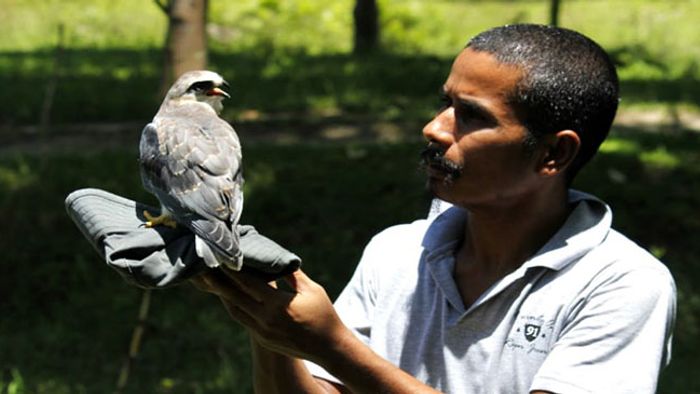Meet Manoj Gogoi, the Man who has Rescued over 5,000 Animals in Kaziranga

- Jul 20, 2019,
- Updated Jul 20, 2019, 1:43 AM IST
By: Rana Pratap Saikia
Manoj Gogoi, a tourist-guide-turned animal-rescuer has carved a unique identity for himself for his dedication in (lovingly) rescuing over 5,000 animals in and around the Kaziranga National Park since 2005.
Speaking to Inside Northeast, Gogoi, who is also the subject of the much-feted documentary 'The Man Who 'Speaks' Nature' says that he has been rescuing animals since 2005 because of his inherent love for the beasts of the wild. This year too, the renowned wildlife activist has been very busy rescuing the animals stranded due to the floods in Kaziranga.
Disclosing the origins of his love for the jungle-dwellers, he says: "I have always loved animals, from the heart. It has always come naturally to me, it has been an inner calling, to tend to their wounds, to care for them..."
As a testimony to his great love affair with the beasts of the wild, Manoj Gogoi discloses that he once did not visit his house for more than a month as he was too busy taking care of jungle cat cubs whose mother had been run over by a speeding vehicle. "I tend to forget everything when duty calls, when they need my help", he says with a grin.
Gogoi says that he has learned how to rescue animals by himself, but he has often taken the consultations of veterinary doctors. "I simply watch their movements, their moods, to learn more about them. Of course, the doctors have helped me learn more about the beasts, the birds, and the reptiles and the ailments the suffer from. It has been a gradual learning experience", he says.
The activist has a step plan in dealing with the ailing or stranded animals: firstly, he rescues the wild animals; secondly, he treats them and nurses them back to health; and thirdly, he releases them back into the wild where they had come from.
It has not been easy-going, though, but he is hardly daunted by the perilous task at hand. "I have been afraid at times, because of the danger involved...but rescuing snakes, trying to understand snakes, understanding the movement and behavior of animals, so that I can rescue them and help them is something that I truly enjoy immensely", he says.
Since 2007, he admits to have rescued over 5,000 animals in and near the Kaziranga National Park in Assam, and he says that he has over 5,000 stories to tell because each incident has been memorable for him. "Each experience has been ethched it my memory. Every experience is unique, as the animals are all unique. They all have a story to tell", says the soft-spoken Gogoi.
The rescuer reveals that his organization had truly humble beginnings. "In the beginning, I took the help of 11 youths of Kaziranga...it was just the twelve of us...and we branded ourselves as the Naturalists for Rehabilitation of Snakes and Birds (NRSB), but now, we have over 100+ members. However, almost all venomous snakes are being rescued by me", he says, with an air of dismissiveness.
Gogoi and his allies have also been conducting awareness programmes for the locals so that they are more aware about animal behavior, and to break the stereotypes surrounding wild animals, that they are 'dangerous'. ""Awareness helps...once a snake had killed 22 hens in a household, but they did not kill the snake and I was called to rescue it. Slowly, the perceptions are changing", he says.
Those funds were used for his wildlife conservation mission till 2013, however, good news came knocking on his door that year. In 2013, the Corbett Foundation decided to fund his efforts and collaborated with him to reach a similar goal in saving the animals in and around Kaziranga.
Speaking on his relationship with the wildlife conservationists Corbett Foundation, he says that they have set up an office at Kaziranga after meeting him and watching a documentary about him, such was their faith in this animal lover from Assam.
Lamenting the current flood situation Assam, the wildlife conservationist says that more highlands must be constructed to ensure the safety of the animals in the park. He further adds that the areas of Karbi Anglong should be developed as the National Park is completely dependent on Karbi Anglong. "33 highlands highlands is too less, we need more and larger ones, to accommodate animals. This year, we saw that many rhinos were cramped in tiny swathes of land, and some of them even got into fights. That must be avoided at all costs. With the proper measures and development of the Karni Anglong side of the Park, I think we can do it", he says with a hint of strong optimism in his voice.
As his parting words, the man who 'speaks' nature says: "When I look at an animal, I try to read it. I try to read it like a book. That is how I have managed to speak with nature."
Inside Northeast’s Campaign #LetsSaveDeeporBeel is now supported by Oil India Limited (OIL). Join us as we continue the awareness campaign to preserve the only Ramsar site in Assam which is facing immense threats (A Ramsar site is a wetland site designated to be of international importance under the Ramsar Convention). We need your help to preserve this site of great ecological importance. Join the #LetsSaveDeeporBeel campaign and tweet about it, and do tag us on Twitter. Let’s make some noise!
Download:
The Inside Northeast app HERE for News, Views and Reviews from Northeast India.
Do keep following us for news on-the-go. We deliver the Northeast.